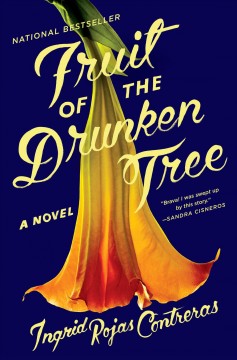Fruit of the Drunken Tree was inspired by author Ingrid Rose Contreras’ experiences in Colombia, South America, from 1989 – 1994 during the reign of drug lord Pablo Escobar. Reviews for the book include “simple but memorable prose and absorbing story line” (NY Times Book Review), “dazzling and devastating” (San Francisco Chronicle), “simultaneously propulsive and poetic” (Entertainment Weekly), “politically daring and passionately written” (Vogue), “a seemingly unlimited reservoir of striking details” (Booklist).1 I was concerned that the book might be a little too devastating, a little too timely and political; I had been warned that another library book club had universally disliked the book, or as our multi-book clubber member said: “it wasn’t hated, it just wasn’t a favorite.”
We had a good attendance for our meeting. Out of fifteen, only two of us hadn’t read it. Our first responders seemed to like the book – not gushing as many had for The Tea Girl of Hummingbird Lane or The Rosie Project, but reflective and thoughtful. Our discussion was personal. We remembered the hardships of our parents and grandparents. We shared our own experiences with domestic abuse. We wondered how we could ever leave the house with such reality of kidnapping and violence outside our doors. We wondered about the impact of media that keeps violence in front of us, whether or not it is even in our community. We compared it to other book club selections: the drought in The Dry, the potato famine in News of the World, American complicity in The Lost City of the Monkey God.
Some of us were disappointed in missing details. We considered the young narrators and how their innocence heightened our sense of fear and dread. We discussed more details than I remember. Were the characters fully developed? We didn’t understand the mother’s behavior entirely. Did we prefer Chula or Petrona as a narrator? Gorrión seemed to truly love Petrona, but still he allowed her to be brutally raped. Can and should we ever be forgiven for our mistakes? There was so much we could have discussed. Layers and layers.
We reviewed a list of some of the many books we have read together over the years. We chatted and snacked and discussed the Sacred Datura plant that grows wild in Southern Nevada and is related to the Drunken Tree used for the title – another shared experience through a book!
Nevada and is related to the Drunken Tree used for the title – another shared experience through a book!
1 Litlovers.com website offers summaries, author bios, and reviews from various sources, discussion questions and more. I often refer to their popular book list for ideas and we have read several books on their lists.
Lundquist, M. (n.d.). Fruit of the Drunken Tree (Contreras) – Book Reviews. Retrieved from https://www.litlovers.com/reading-guides/fiction/11333-fruit-of-drunken-tree-contreras?start=2

The Fruit of the Drunken Tree is aptly named, the story moving and powerful, enticing, but it may make you sick with sadness for the world. The tone of Chula’s story reminded me of my own memory of the past, neither truly childlike nor adult, capturing a kind of arrested development that is truer than reality, much like the saying, “out of the mouths of babes.” As I read, I couldn’t help but worry about the effect of the story on our book club members while also wondering again how anything described could be any more harrowing than the úber-popular thrillers that jump off the shelves of the library. I thought of other book club selections, of Bonnie and Clyde, of the popularity of true crime books, astrology, numerology, witchcraft, saints and Hollywood-happy endings. I can’t help but wonder if I have been kind to tortured souls; if there can be solution to desperation from limited resources, excess and poverty. Can there ever really be equality and justice? In the moment are things suffered really as bad as the memory? Are we lucky not to know? Does time heal all wounds? The parts of the story that struck me most were the little kindnesses. Señora Alma telling her niece that she is as beautiful as Cleopatra; Aurora telling her sister that her communion dress was her wedding dress; Ana at the Colombia consulate helping them find their father; the psychiatrist seeing Chula at the end of her day, when she may have had a child’s graduation, or birthday, or dinner date, or maybe not; Silence. What is going on in our ordinary days that is extraordinarily not noticed or underrated or overrated? Such is the impact of one book that I am glad I read, even though I might not choose to read it again.
I read the comment first without realizing it wasn’t the journal entry. It made me feel the book, The Fruit of the Drunken Tree, would be painful but powerful, a book I should read and just give in to (as I often have to). And then I found the more linear and objective journal entry and could put a pause on my reaction. Wow! Both from you, Kristine! Wish we could have coffee and a face to face, mind to mind discussion in the heat of reading.
Fortunately, we can have these discussions over the phone!
Very enlightening. Thanks for stretching us out of book comfort zone!